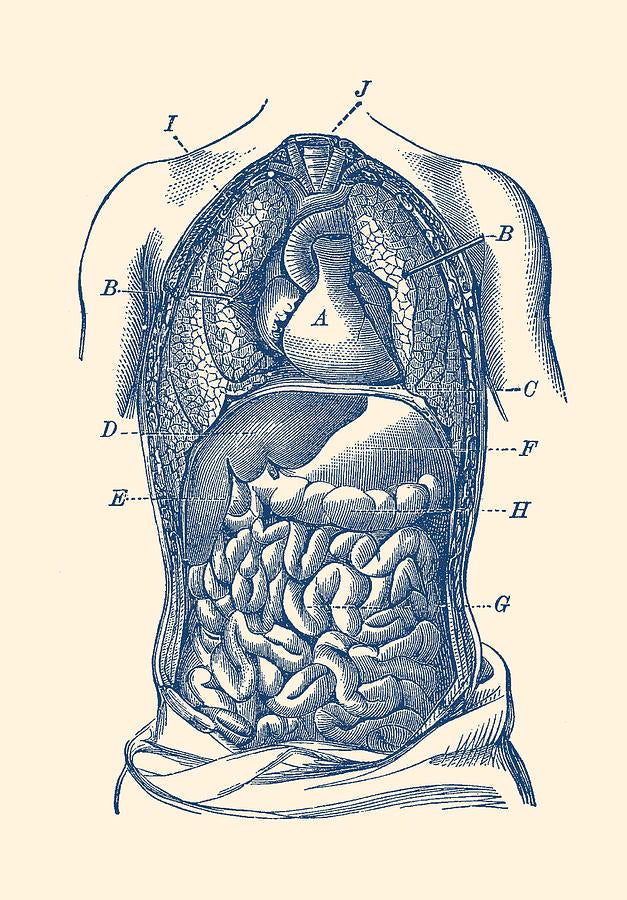The ileocecal valve (ICV) is a sphincter muscle in the digestive tract. It opens and closes to allow digested food to pass from the small intestine to the large intestine.
If you draw an imaginary diagonal line from your right hip to your belly button, you will find it about two-thirds of the way. Pressing gently but firmly will bring about some tenderness in about 90% of people.
At times you might experience ‘puffiness’ in the bottom right quadrant of the abdomen.
The food we consume is processed in the small intestine where we absorb the nutrients, the waste material is moved through via the ileosecal valve into the large intestine, never to return.
But sometimes it does.
If the valve doesn’t function properly it may stay closed, resulting in waste material staying in the small intestine too long. Or it may stay open, allowing waste material, bacteria, to flow back in to the small intestine, where the body starts to absorb it.
This leads to toxicity and causes a myriad of symptoms.
A Contributing Factor of Poor Health
When the ICV malfunctions it can have a huge effect on overall health leading to a feeling of general malaise and other symptoms..
It is a fairly common condition but remains largely undiagnosed and untreated, causing many miserable health conditions.
Causes of Ileocecal Valve Syndrome
There are several reasons the ICV might malfunction –
- Stress – as usual, a familiar culprit in many illnesses. Pressure, worry, fear and upset all have an effect on the body. You only have to think about the gut and the vagus nerve connecting to the brain. Thoughts effect our gut health and our gut health effects our mental health. A “gut reaction”.
- Digestion – Food sensitives, too much cooked food, not enough raw. Not enough stomach acid, or digestive enzymes. Too much roughage.
- Physical weakness – too little or too much exercise disturbing the digestive system.
- Energy drains – phones, too much screen time. Electro-magnetic pollution.
Symptoms Linked to ICV Malfunction
- Abdominal pain, SIBO, IBS, gas, gurgling, right groin pain, bloating, distended belly, burping, indigestion, colitis, diverticulitis, nausea.
- Bad breath, body odour.
- Joint pain, arthritis, frozen shoulder, hip pain on the right, carpal tunnel syndrome, right shoulder pain at night, headaches, sudden low back pain.
- Tinnitus and heart flutters.
- Flu like symptoms, chronic fatigue and general lethargy.
- Failure to recover from post viral fatigue.
- Dizziness, dehydration, blurred vision.
- Depression and nervous debility.
- Eczema and psoriasis, acne, pale complexion, dark under the eyes.
- Pseudo sinus infections
Treatment
- Address constipation with herbs to improve peristalsis.
- For a time eliminate nuts, seeds and wholegrains.
- Avoid cruciferous vegetables like cabbage and broccoli and any food that create gas eg, lentils, beans.
- Practice ileosecal valve massage.
- Ask for advice on taking anti-bacterial and anti-fungal herbs – Andrographis, Oregano oil, Allicin releasing garlic supplements, and bitter herbs like Dandelion, Milk thistle and Artichoke.
- Take digestive enzymes with food.
- For bloating take activated charcoal – 2 to be consumed 2/3 hours away from food as it can absorb nutrients from the food.
- Drink warm, soothing, anti-inflammatory Chamomile, Meadowsweet, Marshmallow root tea.
- Address effects of stress with Lemon balm, Ashwagandha, Passionflower.
For more information and support please contact us.

Share:
Take Heart
10 Signs that You Need to Look After Your Lymph System and How to Do It